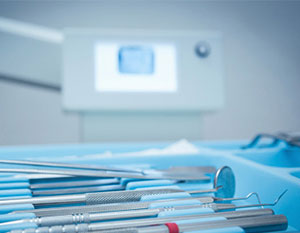by Steven J. Anderson, Total Patient Service

My oldest daughter and her new husband just purchased their first washer and dryer. As expected, they did a considerable amount of research online and in retail stores comparing product features, prices, and warranties. After comparing all of their choices, they selected what they felt would be the best value for their investment. They did not purchase the cheapest option; instead, they chose the product that they felt would give them the best return on their investment.
Isn’t that how we all determine whether or not we are making a good decision on our purchase? We do it by comparison. We determine value or whether something is expensive or cheap by looking at the alternatives.
To what do people compare the price of dentistry?
For most patients, because of the subjective nature of diagnosis and treatment planning and the relationship with the professional that goes along with dental care, they don’t do much “shopping” around. And if they do, it is limited. So, if you don’t have much to compare it to, there is only one conclusion you can draw: it is expensive! So whether you charge $250 for a crown or $2,250, you are most likely to be perceived as being expensive. Think about it: have you ever had a patient tell you that you were cheaper than they expected? Not likely! So, if you are going to be accused of being expensive, no matter what your fees are, then be it!
While a great dental practice is built on solid patient relationships, not cheap fees, there is a practical science to fee setting that you need to seriously consider. Whether you are contracted or not, you still have to set your specific fees-for-service. And, how you set those fees can make a significant difference in the success of your practice.
Step 1: Compare.
While most of your patients will not take the time to shop around and compare your fees to those of another practice, you should! We recommend doing an annual fee analysis to see how your procedural fees compare to those of other practices in the area. This information is generally available and the analysis can be done for free by companies like the Total Patient Service Institute. This data is gathered from dental insurance claims and comes from nearly every dental office in the country. The analysis shows what the fee is for each service based on a percentile range. For example, the analysis will show the percentage of offices in your area that charge more or less than a given fee for each procedure.
Step 2: Choose your target.
Once you have the analysis, go procedure by procedure and target your fees to be in at least the 80th percentile. If you have not done this for a while, you may find that you are way above or way below the 80th percentile mark. This is why getting a fee analysis at least once a year is a much-needed checkup!
Step 3: Be confident in your fees.
Every day, you and your team are faced with fee and money objections. How you handle those objections tells your patients a lot about the kind of professional you are. If a patient ever ask your team to consider discounting your fees or asks you why they are so high, your team can respond confidently by saying, “Our fees are what they are so we will never have to apologize for the quality of our care and service.” (You might have your team memorize that!)
Step 4: Believe it.
We often suggest to financial coordinators that they rehearse in the mirror how they will quote the fees. Repeating the words and saying them while looking yourself in the eye does a lot to build your confidence. Dentists can benefit from doing the same. But, for the team members who are doing financial arrangements and quoting fees that they themselves may not be able to afford, it is important that they be able to quote fees confidently without any hesitation.
If there is a mistake that most dentists make in the area of setting fees, it is that they don’t set them high enough! Have the fee analysis done every year for your practice and keep your fees where they should be. Then have a team around you that can quote your fees with confidence. Your expertise has come at a high price and your patients will value your work the more you do!
Steven J. Anderson is the President of the Total Patient Service Institute (www.TotalPatientService.com) that provides high-level patient service and practice productivity training for dental teams around the world. Total Patient Service provides a complimentary fee analysis for CWA clients. Simply email or call with the zip code of your office and you will be sent a fee analysis and receive a complimentary phone consultation. Call 1-877-399-8677 or email: Answers@TotalPatientService.com














